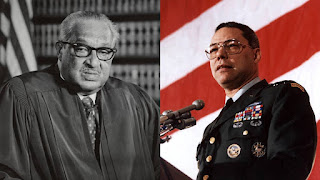 |
| Thurgood Marshall and Colin Powell (Tablet) |
One of the most interesting things about Colin Powell is that he spoke Yiddish. Which he tried to use on Itzhak Rabin when he was Israel’s Prime Minister. Powell learned Yiddish having been raised in a Jewish neighborhood in New York.
To be honest I did not know about Thurgood Marshall’s involvement with the Orthodox Jewish community until I read about it in a Tablet article by Nathan Lewin. He worked for Marshall when he (Marshall) was the Solicitor General. He had just been appointed and had inherited the lawyers that worked under the previous Solicitor General. He interviewed those lawyers - one of whom was Lewin. Here is what happened:
Being relatively junior, I came late in the process. When notified that it was my turn, I entered his office, shook hands, and reviewed my education and experience, which included attendance at Yeshiva University and Harvard Law School, and service as a law clerk on the Court of Appeals and the Supreme Court...
When I finished, I thought I had better warn him that I was a Sabbath-observer and would be unavailable on Saturdays and Jewish holidays. All my prior bosses—Judge Lumbard, Justice Harlan, and professor Cox—had known this and readily accepted my absences.
I began by telling Marshall that I was an Orthodox Jew who observed the Sabbath. Since the holidays were approaching, I thought I had better mention those, too. So I continued, “In addition to Saturdays, I can’t work on the Jewish holidays, and they are coming soon. First there is the Jewish New Year, Rosh Hashana, and then comes the holiest day of the year, Yom Kippur.”
At this point, the judge interrupted. “Yes, and then there’s Sukkot, Shemini Atzeret, and Simchat Torah.” I almost fell over. “That’s right,” I said, and added, “But how do you know that?”
“Easy,” Marshall replied, “I grew up in a Jewish neighborhood in Baltimore. In fact, I made some money by turning off lights in homes there on Friday nights.”
This is a remarkable story that seems counterintuitive if one reads about the antisemitism of certain black advocacy groups – whose views tend more toward the Farrakhan narrative rather than Nat Lewin’s.
There are a couple of things about this I believe should be noted. One is the fact that being black does not preclude being wildly successful. Another is that it refutes the false notion held by some of my coreligionists that black people are inherently antisemitic – especially to Orthodox Jews.
What about the claim that there is an inherent level of racism by the white majority in this country? I reject that notion. While racism does exist on the fringes of society. it does not exist to any significant degree amongst the mainstream. What I do however accept is that there is a high degree of prejudice that many, perhaps even most white people have against black people. Sadly, I think that prejudice exists even among black people themselves. The example I always point out to demonstrate this is when many years ago civil rights activist, Jesse Jackson expressed relief that the person following him in a dark alley one night was white and not black.
It is ridiculous to say that Jesse Jackson is racist. But it is nevertheless reasonable to say that he prejudiced against his own people - strange as that may seem.. There is a difference between racism and prejudice. Neither of which is good. But the former is irrational. Skin color has absolutely nothing to do with a person’s character. But a culture of crime in poor neighborhoods that are predominantly black does have an impact on an individual’s view of black people.
Although it does not in any way excuse it, it helps explain the sad phenomenon of ‘driving while black’. When a black person driving a car is stopped by police they will far more often be treated like a criminal than when when a white person is stopped. It doesn’t even matter when the police involved are black. The unfair prejudicial suspicion of blacks is the same.
If on the other hand the black driver is recognized as successful personality, he will be fairly treated by the police in the vast majority of cases. If he is not recognized, prejudice will prevail. So that if, for instance Colin Powell had ever been stopped by a cop (whether back or white) that didn't recognize him, he would very likely experience the demoralizing prejudice that so many ordinary black people so often experience.
This is a legitimate complaint by movements like BLM. That is what they are fighting. Or least it should be.
What should not be lost in the shuffle is that fact that black people can, and do achieve the promise of America. That is what Colin Powell was all about. All that is required is having the desire, the determination, working hard, and a little bit of luck. Colin Powell reached the pinnacle of success in his field despite having come from very modest beginnings. For Powell, being black was not an impediment to success. Nor was it an impediment for Thurgood Marshall or Barack Obama.
This will not wipe out the existing prejudice. The only thing that will do that is changing the culture of ignorance, poverty, and crime that is perpetuated in predominantly poor black neighborhoods.
I don’t know how to fix that. Although a good start would be to change the educational paradigm in those neighborhoods. But in my view, changing that culture is the only thing that has any chance of success.